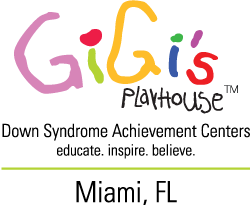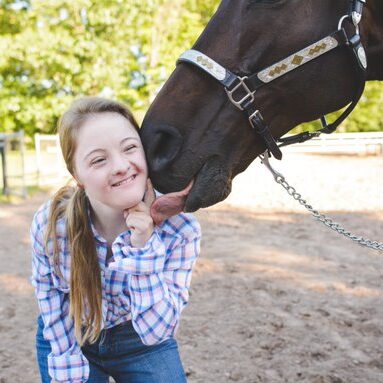Different is just another similarity. Down syndrome through the eyes of an outsider

Down syndrome is an intellectual disability that about 5,000 babies in the United States are born with each year. A person with Down syndrome has 47 chromosomes, which are microscopic structures that carry genetic information and help determine almost everything about them. The majority of people only have 46 chromosomes. Physical characteristics (such as short stature and an upward slant to the eyes) as well as speech and developmental delays can all be caused by the extra chromosome. Still, people with down syndrome are a lot like us: They are unique people with talents and strengths.
Children with Down syndrome learn and grow in different ways and at different speeds. They will sometimes have delayed speech and basic skills like getting dressed, eating, or potty training. Hypotonia (low muscle tone) is common in children with Down’s syndrome. Most children with DS typically reach developmental milestones like crawling, standing, and walking later than other kids. Their reduced muscle tone definitely improves over time. These children are also more prone to diseases like leukemia or pneumonia which is also more common for them to get than in their peers.
There has been plenty of studies on how parents react or feel to having a child with Down syndrome. The common initial reactions were: lack of acceptance and even denial. A few mothers hoped that one day their child would be free from this disability. Most parents were not satisfied with the amount of information and support that had been provided to them, and they perceived it as too negative. The results indicated that improving the communication with the parents, listening to their concerns, and facilitating active participation in treatment should all be central to the care that is provided at the time of the diagnosis.
Mothers of children with Down syndrome appear to experience poor mental health and require greater support and services to improve behavior management skills for their child and their own psychological well-being. These mothers experience painful and confusing feelings when they first learn that their child has Down syndrome. Parents need to establish certain limits in order to help their child with Down syndrome to learn behaviors that are appropriate. In setting up rules and providing discipline, parents should display positive interactions with the child. Children have to receive positive messages about themselves and what they do.
Parents of children with Down syndrome need to have their child play with other kids who do and don’t have Down syndrome. They should keep their expectations high as their child tries and learns new things. Make time to play, read, have fun, and go out together. They should support their child in doing day-to-day tasks on their own. It is very important for the parents to learn the appropriate way of talking to their children. They should avoid saying “That’s wrong” to correct mistakes. Instead, say, “Try it again.” Offer as much help needed. This is very essential and necessary for children with Down syndrome.
Growing up with a disability is life changing and it can change those around you. I am hard of hearing and my family is used to always raising their voice whenever I don’t have my hearing aids on. Kids would always ask me what I had on my ears and sometimes I did get bullied for it. I learned to overcome it with the love and support I had from my family and friends. It is a different disability, but I feel like I can connect with children that have Down syndrome. I always grew up feeling like an outsider but with time, I started to realize that there will be people that will make time to understand me and have patience with me. Seeing volunteers helping kids with Down syndrome is really eye opening because I know that it takes patience and effort but at the end of the day, it truly does come from their hearts.
Whenever people hear the word “disability”, they usually have this look on their face of pity or confusion. We need to educate one another and learn that sometimes some people will need more help than others. I feel like there will always be days that will feel very challenging and even exhausting at times, but sometimes a few more minutes of someone’s time to help a child with Down syndrome will go a long way. Whenever I read or hear a parent’s experience with their child that has Down syndrome, I just look up to them and see them as superheroes. Everything these parents do just for their child to have the same experience as any other kid is truly amazing. I truly think these kids are a blessing and they definitely help people come together and experience such pure love. I definitely wish to connect with anyone that has Down syndrome and hope to learn something amazing about them.
By. Joselin Rojas


